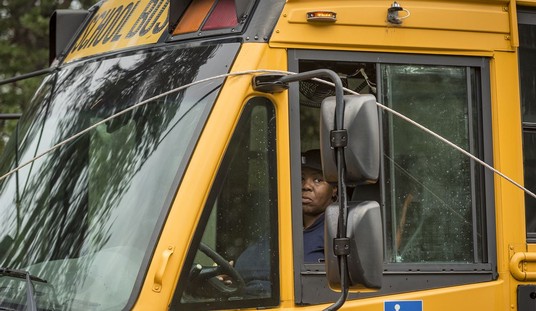Bucknell University, a well-regarded liberal arts institution set in a picturesque location in the rolling Pennsylvania countryside, looks entirely benign. Its campus is safe, its students intelligent. It counts among its alumni the famed author Philip Roth and Leslie Moonves, the president of CBS. It’s a college to which most parents would be proud to send their kids.
But if your son or daughter is the type who might join the Bucknell University Conservatives Club (BUCC), you would be well-advised to send him or her somewhere else. Because Bucknell really, really does not want to hear what the students of the BUCC have to say.
The BUCC has never exactly been welcome at Bucknell, and as the movie Indoctrinate U shows (directed by a Bucknell alum), the university is hardly a stranger to free speech controversies. The college’s latest assault on the free expression of its students began in March, when the students of the BUCC earned the administration’s ire by passing out satirical “Obama Stimulus Dollars” — fake dollar bills with President Obama’s face on the front and the sentence “Obama’s stimulus plan makes your money as worthless as monopoly money” on the back. Only an hour of this apparently unacceptable behavior was tolerated before administrators “busted” them for “solicitation” without prior approval. A look at Bucknell’s “solicitation” policy quickly reveals that, unsurprisingly, for something to be solicitation it must be trying to sell you something, but that didn’t stop Bucknell from illegitimately using the policy to shut down the BUCC’s protest.
Only a couple of weeks later, the BUCC was back with more pesky activism, this time in the form of a satirical “affirmative action bake sale” protest. Affirmative action bake sales are a common form of college protest in which organizers put together a mock “bake sale” complete with a sign that advertises baked goods for different prices depending on the race of the buyer. Whites and Asians pay more than blacks and Hispanics for the same items. Protest organizers use the sales to spark debate over affirmative action policies. They are not a moneymaking venture, and, in fact, the bake sale protest idea is not new — affirmative action bake sales are based on earlier “gender gap” or “pay equity” bake sales, which intended to demonstrate the difference in pay between men and women by charging men less than women for the same baked goods.
As the BUCC conducted this protest on April 7, they once more had about an hour before an administrator showed up to shut the students down. Captured on video, Associate Dean Gerald Commerford actually told the students that Bucknell had the “opportunity” to shut down the sale. The pretext? The students were charging less for donuts than they said they would on their event permit. When the students offered to immediately raise their prices to match those on the permit, Commerford refused. After all, why miss such a good “opportunity” to shut down debate and dissent on campus? Commerford assured them, though, that they could reapply for a permit and have the sale again sometime down the road.
The BUCC, taking Commerford at his word, quickly applied to have another bake sale protest a couple of weeks later. Mysteriously, this time they were told they would need special permission to hold such a “controversial” event. (Such a requirement is not found in any written Bucknell policy.) Their request came before Dean Commerford, who, of course, rejected the request in a recorded conversation. Inventing yet another requirement on the fly, Commerford told the students that they could only debate the topic of affirmative action in a formal debate-type format where the other side had an opportunity to speak at Bucknell.
At this point, the students turned to the Foundation for Individual Rights in Education (FIRE), which wrote Bucknell in protest. But Bucknell’s response, which came only after FIRE took the case public and embarrassed the college into responding, did not even address FIRE’s objections, and instead took the route of distraction and deceit. (If you’d like to help FIRE convince Bucknell to change course, you can write to President Brian Mitchell and others here.)
The vast gulf between the image of Bucknell, which explicitly prohibits “deliberate interference” with freedom of speech, and the far more repressive reality should disturb every American — especially because it is representative of all too many colleges in America today. FIRE’s Red Alert list of the “worst of the worst” colleges when it comes to liberty on campus contains some of America’s best-known institutions perpetrating serious injustices, and Bucknell may soon join the list if it continues to refuse to respect the promises of free speech it has made to its students.
For instance, Johns Hopkins University, known for its prestigious medical school, saw fit to punish an undergraduate for an insufficiently politically correct party invitation on Facebook. Brandeis University, named after one of America’s most important defenders of free speech, Justice Louis Brandeis, punished a professor of fifty years’ experience for saying the word “wetbacks” in his Latin American Politics class — in the context of criticizing it! And Michigan State labeled a student a “spammer” not for peddling discount “V1AGRA,” but for sending e-mails to selected faculty members about, of all things, changes to the academic calendar.
It’s a sure bet that the vast majority of Americans don’t think of infringements of liberty when they think of these schools. But maybe they should. When a local police department tramples on someone’s rights, it’s correctly considered news. There is far less outcry when Bucknell, or Johns Hopkins, or Michigan State decides that some students’ expression or ideas are worth less than others’. Yet the damage in the latter case may end up being more damaging to our society. College students — among them our future leaders — are being taught that freedom is to be distrusted, that authority may be arbitrary instead of lawful, and that some ideas are just too dangerous to express. If colleges succeed in convincing the majority of their students that these lessons are true, our nation is in great peril.









Join the conversation as a VIP Member